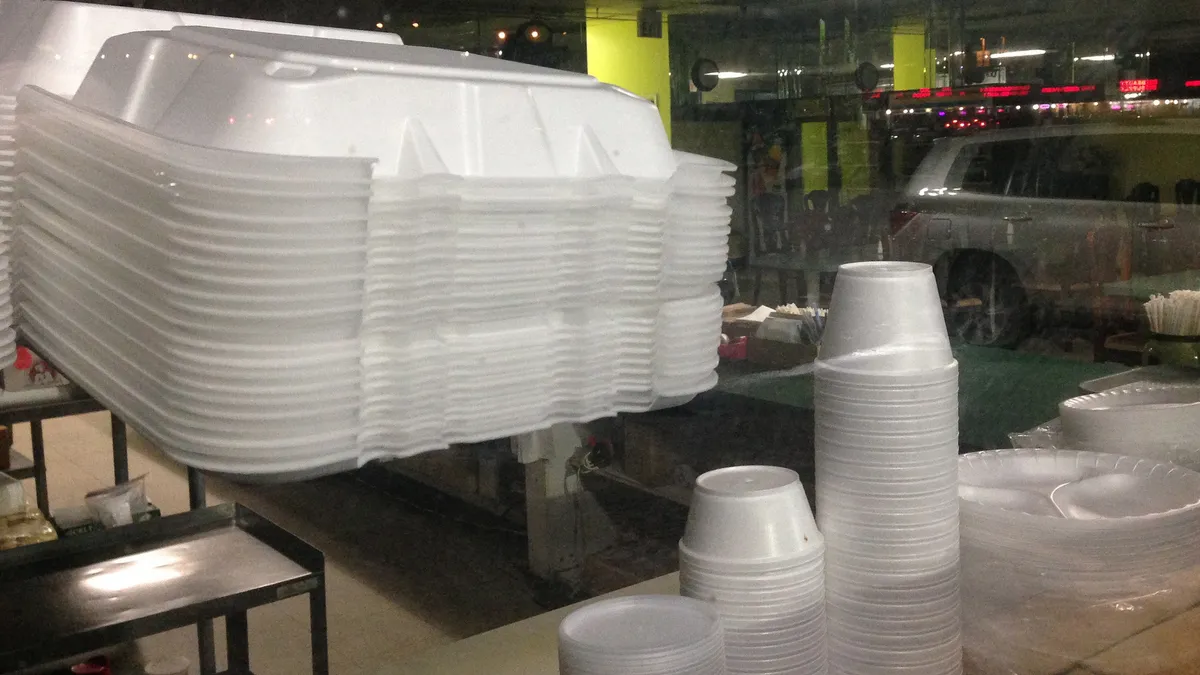UPDATE: Oct. 16, 2018: The San Diego City Council recently voted 5-3 in favor of an ordinance to ban the sale of expanded polystyrene foam food containers, coolers, marine equipment and others items effective in 2019, as reported by the The San Diego Union-Tribune.
This law will also ban the city government from purchasing such products, as well as require businesses to only make plastic utensils and straws available on request. A waiver process was established to allow small businesses additional time to comply. City rules require one final vote on the ordinance at an upcoming meeting, at which point the council could secure a veto-proof majority against any potential mayoral action.
Dive Brief:
- San Diego Councilmember Chris Ward has introduced a proposal to ban food containers made of expanded polystyrene (EPS), commonly known as Styrofoam.
- The measure would restrict the sale and distribution of EPS used for food and beverage containers, meat and fish trays, egg cartons, coolers and beach toys. It will also cover the sale of food service items containing EPS, such as plates, cups and utensils.
- Last July, the council unanimously approved making San Diego one of a select few to accept EPS food containers as part of its curbside recycling program. Ward now says the program is too costly and ineffective because food-contaminated foam containers are being sent to landfill. Though in a follow-up email to Waste Dive, his communications manager wrote that "this proposal would not necessarily end the current recycling program, and Councilmember Ward will leave that up to his colleagues during the discussion of this item."
Dive Insight:
San Diego's foam recycling program launch last year surprised some people, considering that more than 100 other California cities and towns have banned the product. A statewide ban has also been under discussion for years, though so far that effort has been unsuccessful.
Although EPS foam is technically recyclable, the limited number of businesses doing it means that doesn't come cheap. San Diego's foam recycling program costs the city about $90,000 per year. Questions also remain about how such programs can deal with food contamination and whether they're economically viable in the long-term without packaging industry support. While drop-off options are available, few other cities accept the material in their curbside programs.
Councilmember Ward cites San Diego's Zero Waste Plan — 75% waste diverted from landfills by 2025 and "zero waste" by 2040 — as a reason for instating a foam ban. "Addressing the Styrofoam products in our environment and landfills is a critical step to achieving this goal," Ward said in a statement.
Numerous city leaders previously had noted the Zero Waste Plan goals in regards to the city's EPS recycling program as well. "By expanding what we’re able to recycle, we’re moving in the right direction as we try to reduce, reuse and recycle as much of the trash we collect every day as we can," San Diego Mayor Kevin L. Faulconer told sister publication Smart Cities Dive earlier this year.
Although legislation rarely moves quickly and this ordinance would take some time to go into effect, it was introduced about 11 months after the EPS curbside recycling program began. That raises the question of whether less than a year is enough time to implement and evaluate the effectiveness of a recycling program. The possibility that this curbside program could still continue if a ban is passed raises further questions.
The ban-or-recycle debate is tricky for cities that wish to increase their environmental image by reducing harm from controversial items like EPS foam and single-use plastic bags. Each city has to consider different factors, so no silver-bullet solution exists. For example, although Portland, Oregon has a foam ban, other nearby municipalities might choose to partner with a local business such as Agilyx, which recently opened a foam-to-oil polystyrene recycling plant.















